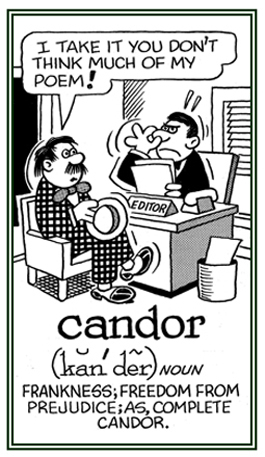cand-, can-, cend-
(Latin: to glow, to glow with heat; to burn; to glitter, to shine; white)
2. Related to honesty and unbiased opinions, even when the truth is not pleasant to hear: Mary decided to give her candid statement to Paul and so she told him that she liked him, but she was not in love with him.
2. Etymology: from Latin candidus, "white" and candidatus, "clothed in white" from the white togas, which were long, shining, white cloaks that were worn by Romans who were seeking political offices.
Although the word candidate refers to the purity of "white" there are too many who are or who become corrupted
When a man ran for public office in ancient Rome, he obtained a toga which was a long, shining, white cloak.
With this "shining white" outfit, the candidate stood out in a crowd and the people might have considered him to be associated with purity and goodness because of the symbolism of the garment.
The term candidate is derived from a person who was a candidatus, "clothed in white", which was symbolical of the supposed purity of the person.
2. A unit of luminous intensity, defined as a fraction of the luminous intensity of a group of 45 carbon-filament lamps; used from 1909 to 1948 as the international standard.
3. Etymology: from Ole English candel, early church-word borrowing from Latin candela, "a light, a torch"; from candere, "to shine".
Candles were unknown in ancient Greece where oil lamps were used, but they were common from early times among Romans and Etruscans.


Go to this Word A Day Revisited Index
so you can see more of Mickey Bach's cartoons.
The editor of the newspaper titled the lead editorial, Dat veniam corvis, vexat censura columbas because it was a statement of her opinion of the city officials who sought to censor her newspaper.
Cross references of word groups that are related, directly, indirectly, or partly to: "fire, burn, glow, or ashes": ars-, ard-; -bust; caust-, caut-; crema-; ciner-; ether-; flagr-; flam-; focus, foci-; fulg-; gehenna-; ign-; phleg-; phlog-; pyreto-, -pyrexia; pyr-; spod- (ashes; waste); volcan-.

